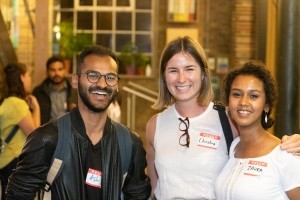EIT ChangeMakers targets start-ups from ‘underrepresented’ backgrounds: ‘We need ideas from new kinds of people’

Evidence would suggest that the European start-up ecosystem has not been overly inclusive, a conclusion most sharply reflected in access to funding.
According to data from Amsterdam-based investment advisory group Dealroom.co, 93% of all funds raised by European VC-backed companies went to all-male founding teams in 2018. Meanwhile, a report from the British Business Bank commissioned by the UK government recently revealed for every £1 of venture capital investment in the UK, all-female founder teams get less than 1p, all-male founder teams get 89p, and mixed-gender teams 10p.
A similar picture is painted for founders from ethnic minority backgrounds. A 2015 paper from the Economic and Social Research Council concluded: “Particular ethnic groups find it more difficult to obtain credit for their businesses. Rather than direct discrimination, this is largely due to a greater prevalence of risk factors such as business age and financial track records.”
And while ethnic minority businesses contribute £32m to the UK economy annually, ‘under-resourced immigrant entrepreneurs’ tend to focus on the same ‘low-cost business niches’, such as small-scale retailing and catering.
EIT Food is a European initiative to support start-up innovation. A lack of diversity in is something business creation manager Lukxmi Balathasan believes is reflected in the start-ups that apply to participate in its programmes. Anecdotally, Balathasan suggested fewer founders from diverse backgrounds engage with EIT Food's initiatives.
“At EIT Food we notice that a lot of the start-ups we see asking for assistance through our programme and more generally in the wider world are from similar socioeconomic backgrounds and ethnic identities - that’s not to mention the lack of women leaders in agri-food start-up space,” she noted.
‘We need fresh ideas’
When we look at innovation, a lack of diversity matters. Game-changing invention is propelled by varied perspectives that are able to challenge the status quo. Diversity is therefore a positive for any innovation ecosystem and promoting diversity can help deliver greater economic and societal value.
In the food space, the sector is faced with the significant long-term challenge of providing enough safe, nutritious food to meet the requirements of a growing global population without exhausting our finite planetary resources. The need to challenge the status quo is clear.
“We need new ideas from new kinds of people to transform our food system for the better,” Balathasan told FoodNavigator.
“Looking for the solutions in the same places - and from the same types of people - that created [the food system] in the first place isn't going to work. We need fresh ideas, and we need to learn how to listen.”
According to Balathasan’s assessment, the people who are underrepresented in ‘many spheres of professional life’ are also often those ‘most adversely affected by our current food system’. These groups can include people who live in countries ‘at the forefront of the effects of climate change’ as well as those who are not able to afford healthy and nutritious food.
To tackle the issue, EIT Food has created its ChangeMakers programme - which culminates in a Start-up Weekend on the 4-6 October. Through the initiative, EIT Food aims to support ‘diverse entrepreneurs from underrepresented backgrounds', helping them to launch their ideas, learn new skills and connect with an ‘amazing community’, Balathasan said. Start-up participants in the weekend event will also have the opportunity to pitch for a total of €30,000 split across three winning teams.
Moving towards diversity in food tech
EIT Food has identified gender inclusivity as a ‘strategic priority’, meaning all its projects have to consider how to address equality issues in funding proposals.
“We know that to build a more sustainable world, gender equality is critical, and the start-up space is no different,” Balathasan stressed.
While gender equality is embedded in EIT Food’s structure, EIT Food has ‘expanded beyond gender equality’ when considering its entrepreneurship and start-up programmes. “We believe that to innovate and build sustainable, transformational start-ups the sector requires diversity of thought and multiple perspectives.”
Indeed, research from McKinsey & Co suggests that diverse companies have a greater chance of economic success. A 2018 study of 366 public companies across the UK, Canada, the US and Latin America found businesses in the top quartile for racial and ethnic diversity are 35% more likely to have financial returns above their respective national industry medians. Companies in the top quartile for gender diversity are 15% more likely to have above average financial returns.
There is no silver bullet but Balathasan believes ChangeMakers represents an important step towards greater diversity in food tech. "Clearly, this is a complex problem with myriad causes - but if we can support underrepresented groups, we can hopefully go some way to helping them overcome the very specific barriers that they face - on top of all of the usual trials and tribulations of being the founder of a business."
In the short-term, Balathasan said she’d ‘love to see lots of applications’ for its ChangeMakers event, which will be held in London this Autumn. Applications (which only take around 15 minutes to complete) close next week (4 September).
ChangeMakers has more ambitious goals in the medium- and long-term.
“We hope that our ChangeMakers programme will help to spur a new generation of food tech founders from underrepresented groups who are helping to find innovative solutions to make our food system trusted, healthier and more sustainable.
“The ultimate goal of this programme is for all our EIT Food business creation activities to have equal representation of founders of all genders and ethnicities. The ChangeMakers will become less of a standalone programme but a community for diverse founders to forge relationships, to find out how they can get involved with all our programmes, and access specific support to level the playing field.
“We want EIT Food to be known as an inclusive and supportive ag-food innovation organisation, and also as the European reference programme for all ag and food tech entrepreneurs and start-ups, where investors can find the next best start-up.”
The EIT Food ChangeMakers Programme is a collaborative initiative between EIT Food, YSYS and King’s Cross Impact Hub which gives diverse talent the chance to become agrifood-tech innovators and entrepreneurs through a series of events, mentorship and training.
It is currently seeking entreprenures from underrepresented groups - such as women, non-binary, Black, Asian and minority ethnic and LGBTQI communities - who are interested in launching a start-up in the food sector.
Entrepreneurs can apply for one of the limited spaces at the ChangeMakers Start-up Weekend on 4-6th October at King’s Cross Impact Hub, London. Here they can learn more about food system issues, develop viable business ideas, find potential co-founders and pitch for €10,000 worth of support. The application deadline is 4th September 2019. Find out more here.




















